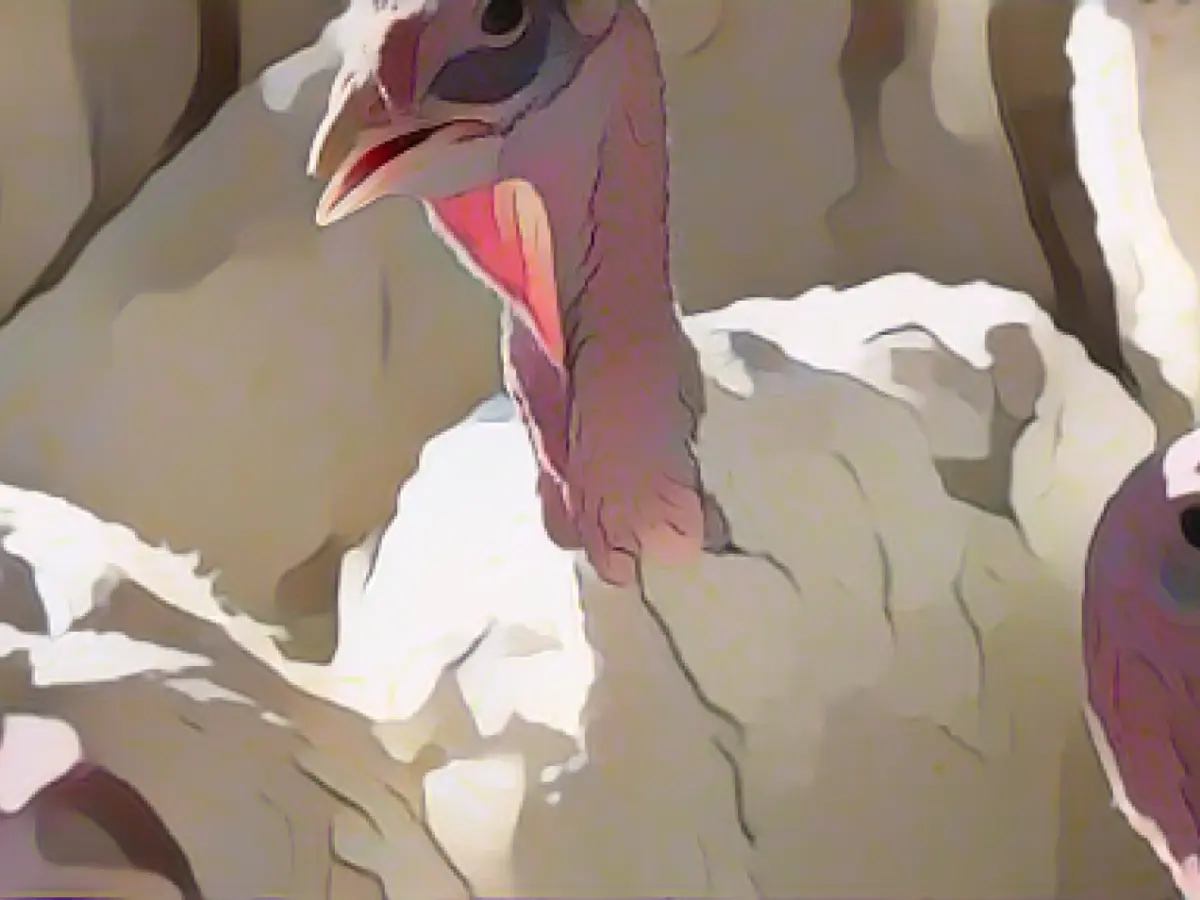Animals - More bird flu outbreaks in poultry farms again
The number of bird flu outbreaks in German and European poultry farms has recently risen significantly again. There have been around a dozen outbreaks in Germany since October, Timm Harder, head of the National Reference Laboratory for Avian Influenza at the Friedrich Loeffler Institute (FLI) near Greifswald, told the German Press Agency. "Across Europe, it goes far, far beyond that."
According to him, turkeys were particularly affected in Germany in November. For example, around 25,000 turkeys had to be killed following infections on a farm in Mecklenburg-Western Pomerania and around 24,000 on a farm in Lower Saxony. According to the latest FLI report, more than 1.6 million farmed birds were affected across Europe in November alone. According to the report, Hungary was hit particularly hard. The FLI had upgraded the risk of spread at the beginning of December.
Bird migration and new genotypes
According to Harder, the more frequent outbreaks in poultry farms are linked to seasonality. "And this is ultimately caused by bird migration." According to Harder, another reason for the increase could be new gene variants of the virus. Previously, a genotype had been rampant that was more difficult to spread to poultry. This particularly infected seagulls. This genotype has now disappeared. "Because either there are no more seagulls left or the others are immune."
Four new genotypes have recently emerged in Germany, said Harder. This may make it easier for the virus to spread.
State of emergency as the new normal
A state of emergency has established itself as the new normal for bird flu in recent years. For a long time, bird flu only played a role in this country during the cold season because migratory birds brought it in. In 2021, there were also cases in summer for the first time, and then to an even greater extent in 2022. Since then, bird flu has been rampant in this country all year round. It has also spread around the world on an unprecedented scale. Currently, "the white spot" only consists of Oceania and Australia, as Harder said.
Concern about Antarctica
Experts continue to look to the Antarctic with great concern. The virus has arrived on offshore islands. "It's practically an overnight trip for an albatross," says Harder about the distance. There are 20 million penguins on the Antarctic continent, which are close together when they form their colonies. "If one of them is infected, it will certainly spread quickly." It is difficult to collect samples in the region and get an accurate picture.
Recently no evidence in mammals in Germany
The global spread also increases the risk for creatures other than birds. Many mammals have already been infected and died, presumably because they ate infected birds. According to the FLI report, there was no such evidence in Germany in November. According to Harder, this is also due to a previous decline in wild birds. "There are simply fewer carcasses, fewer sick wild birds that fall victim to carnivores."
The risk to humans from the globally rampant virus group is still considered to be low, said Harder. "We are not seeing any new cases." The latest cases in South-East Asia are a regionally widespread form of the virus.
Read also:
- Snow chaos further restricts Bavaria
- Unanimous decision: faster wolf culls possible
- The year of climate records: extreme is the new normal
- Snow and ice paralyze southern Germany
- Despite the efforts of poultry farmers in Mecklenburg-Vorpommern and Lower Saxony to prevent the spread of bird flu, around 49,000 turkeys had to be culled due to outbreaks on their farms, as reported by the German Press Agency.
- The Friedrich Loeffler Institute (FLI) in Greifswald, Germany, is at the forefront of monitoring and studying the impact of the virus on both poultry farming and wild birds in the context of bird flu outbreaks.
- The German government and agricultural agencies have implemented strict measures to contain the spread of bird flu to other animals and regions, including regular testing of birds in livestock farms and wild birds in their habitats.
- It was revealed that the recent outbreaks of bird flu in Germany have caused significant economic losses to the agrarian sector, particularly in poultry farming, due to the high costs of culling infected birds and re-establishing flocks.
- A vaccine for protecting poultry stocks against bird flu is under development at the Friedrich Loeffler Institute, although the institute notes that creating a stable, effective vaccine remains a challenge due to the evolving nature of the virus.
- In response to the global spread of bird flu, the World Organization for Animal Health (OIE) has called for increased surveillance of bird and animal health in affected regions, with a focus on identifying and controlling the movement of infected birds and improving biosecurity measures in livestock farms.
- Experts agree that the strategy for containing bird flu should be a comprehensive approach that combines research, vaccination, control measures, and cooperation among countries, particularly in regions that are key migration corridors for wild birds.
- In light of the risk posed by bird flu and the potential for the virus to mutate and impact multiple species, scientific communities around the world have called for further funding and resources to be dedicated to bird flu research and monitoring.
- Opinions are divided on the potential for implementing stricter regulations on international travel and trade to minimize the risk of transmitting the bird flu virus between countries and regions. Some argue for enhanced quarantine procedures and screening, while others believe that such measures could have unintended consequences in terms of trade and international relations.
Source: www.stern.de






